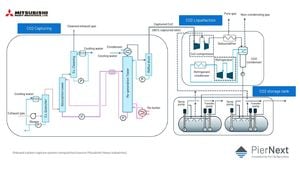The 29th Conference of the Parties to the UN Framework Convention on Climate Change, or COP29, held recently in Baku, Azerbaijan, has been hailed as the pivotal moment for climate finance—a topic discussed with increasing urgency since previous conventions. One primary goal at this year's event was to formulate agreements on climate-funding goals, particularly transfers from wealthier nations to those struggling with the impacts of climate change. Energy Secretary Ed Miliband of the UK took center stage, announcing the UK’s commitment to channel £79 million (approximately $100 million) toward energy projects primarily benefiting developing countries. This funding stems from the UK's broader pledge of £11.6 billion (over five years) dedicated to climate financing, as the nation aims to support the world’s most vulnerable populations.
During the announcement, Miliband asserted, "Climate change does not respect borders, and the UK has seen a year of record-breaking warmth. That’s why we are determined to lead from the front and drive global change, to protect future generations at home and abroad." This sense of urgency resonates among global leaders, as they recognize the necessity of addressing climate challenges comprehensively.
The newly pledged funds are set to support various projects, including innovations focused on clean energy technologies. This encompasses zero-emission vehicles, energy storage solutions, and initiatives aimed at decarbonizing heavy industries such as steel, chemicals, and cement. This financial boost targets not just immediate action but also laying the groundwork for sustained economic growth through decarbonization.
Among the exciting aspects of this funding are allocations of £45 million to the World Bank's energy sector management program, which aids developing nations as they confront energy challenges. Another £15 million will support Innovate UK, aiming to promote clean energy innovation within these countries. The contributions extend to £14 million earmarked for the UN Industrial Development Organization targeted at promoting industry decarbonization initiatives and the development of clean hydrogen technologies.
But COP29 extends beyond specific fundraising. The climate finance discourse centers on establishing new collective and quantified goals for future investments. Discussions highlight the pressing need for developed nations to take responsibility for financially supporting the climate transformation needed to thwart the devastating consequences of climate change.
Yalchin Rafiyev, Azerbaijan’s Deputy Minister of Foreign Affairs and COP29 Lead Negotiator, spoke to the urgency of climate finance, stating, "Today, we come together to address one of the most significant components of our fight against climate change—climate finance." Rafiyev emphasized the conference’s role as not just another treaty-signing event but as a strategizing platform to bring forth substantial recommendations to enable climate action.
Despite ambitious plans, the effectiveness of financial commitments has often been undermined by factors such as the hesitancy of developed nations and the complexity of political climates. Significant voices at the conference also raised concern over the increasingly drawn-out timelines for developing countries to realize the benefits of pledged assistance, especially considering some previous goals like the $100 billion annual target established in 2009, which was only met recently.
Experts estimate at least $1 trillion will need to flow annually to developing nations by 2030 to reach the targets set by the 2015 Paris Agreement, making public-private partnerships increasingly relevant. These partnerships become pivotal as they reduce the risks private investors face, particularly when allocating funds to technologies operating at the cutting edge, or countries with high-risk profiles.
"We hope to see agreements on more public-private partnerships announced at COP29 to de-risk investments and make it easier for private capital to be allocated to sustainable-finance projects," said Cara Williams, head of climate and sustainability at Mercer. Such collaborations are fundamental for bridging the investment gap required to propel decarbonization and adaptation strategies.
Interestingly, COP29 has seen less fluffy rhetoric and grand statements than previous COP meetings, with many attendees focusing instead on practical measurements and technical discussions. Daniel Hanna from Barclays expressed hope for tangible outcomes related to scaling up climate technologies, stating, "We need to collaborate to move faster and smarter on scaling the next wave of climate technologies, investing in adaptation and finding new public-private models to scale capital for the Global South."
The highlight of this conference will be how countries publicly commit to the continuing ambition to close finance gaps and support the transition of developing nations to low-carbon systems. These actions represent not just spoken goals but binding agreements, positioning the dialogue toward actionable outcomes.
Despite such calls for commitment, the challenge remains ever-present as the consequences of climate change intensify globally. Political shifts, particularly those seen around sharply divergent views on ESG (Environmental, Social, and Governance) strategies, add layers of complexity to the financial negotiations underway. While financial institutions like JPMorgan Chase, Deutsche Bank, and Barclays engage at this COP, their representation stems mainly from sustainability teams rather than key executives. This raises concerns about how seriously the broader corporate world regards the conference's goals.
Trump's anticipated reelection prospects ignite fears of rolling back progress made on climate initiatives, with indications he may attempt to dismantle corporate ESG strategies. Given his previous downplaying of climate change, stakeholders worry about potential policy reversals affecting allocations of climate finance from developed to developing countries moving forward.
Meanwhile, the world's multilateral development banks have announced aspirations to raise $120 billion per year by 2030 for climate financing directed toward developing countries. This marked increase signals growing recognition of the urgent need for sustainable finance to build resilience against climate impacts. By establishing these financial frameworks, countries hope to create effective mechanisms for stabilizing resources and fostering transitions away from fossil-dependent systems.
Overall, COP29 serves as both an opportunity and a challenge for meaningful climate finance discussions—one steeped not only in lofty ambitions but also concrete actions, raising hopes for future initiatives targeting climate justice and sustainability. Stakeholders have their eyes on measurable, achievable outcomes from COP29, shedding light on the pressing need for climate collaboration as the world faces mounting climate challenges.



